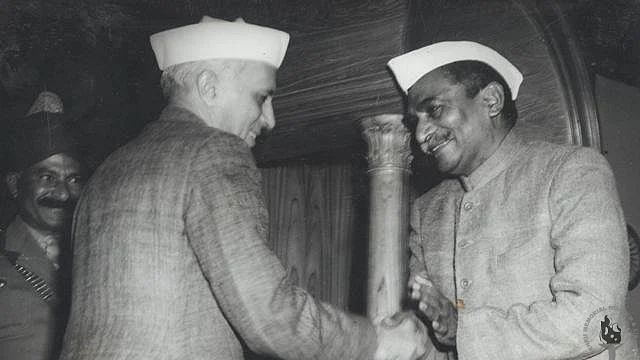When President Rajendra Prasad bypassed the Cabinet
President Rajendra Prasad decided to bestow the Bharat Ratna on Prime Minister Jawaharlal Nehru. Disregarding the convention, the decoration was awarded at a banquet without a citation

Rajendra Prasad, the first President of India, remains till today the only President to have been re-elected for a second term. In fact, having been chosen President when India became a Republic in 1950, he got two years extra till his first formal election in 1952, making it a total of 12 years as President.
He was inducted as Member of the Interim Government headed by Jawaharlal Nehru in September, 1946 and was allocated the Food and Agriculture portfolio. He continued in the same portfolio after independence in the first cabinet of Nehru and was listed at number 3 in the order of seniority of the Council of Ministers after Nehru and Patel.
Under the Indian Independence Act the (Central) Legislative Assembly stood automatically dissolved on August 15, 1947 and the Constituent Assembly became the supreme sovereign and legislative body of which Rajendra Prasad was already the President.
Both Nehru and Patel felt that since Prasad was a Cabinet Minister, the Constituent Assembly should have a new President. But Rajendra Prasad wanted to continue in both the posts. When the matter was placed before Mahatma Gandhi, he tersely remarked: “Even Rajan babu is lured by power. I feel disillusioned.” (quoted by Durga Das in his magnum opus India – from Curzon to Nehru and after).
However, the stewardship of Rajendra Prasad as President of the Constituent Assembly was exemplary and he made many valuable inputs in the draft of the Constitution.
With the new Constitution to come into force on Republic Day, 26 January 1950 India had to have its first President. Nehru was in favour of Chakravarti Rajgopalachari who had succeeded Lord Mountbatten as the Governor General. But the majority in the Congress parliamentary party, dominated by North Indians, favoured Rajendra Prasad. A true democrat that he was, Nehru bowed to the majority opinion in the party led by Sardar Patel.
One of the greatest achievements of Jawaharlal Nehru’s foreign policy was building and cementing ties with the Soviet Union. Nehru visited the Soviet Union in June 1955 and the reception he received on arrival in Moscow, and other places in that country, was unprecedented. Millions of Russian came out in the streets and showered thousands of roses on him wherever he went.
In his memoirs Durga Das gives a first-hand account of the effect the historical visit had: “The visit to Russia made the west feel that it would result in relaxing tension. The feeling in India was one of exultation over the triumphant tour of their national hero.”
“Swept along by the wave, President Prasad decided to bestow the highest honour, Bharat Ratna on the Prime Minister. The convention was disregarded and the decoration was awarded at a banquet without a citation.
“Prasad’s explanation to me was straightforward. He said: ‘Jawahar is literally a Bharat Ratna. Why not formally make him one? He had laid the foundation of peace and you will see the visit will prove of historic significance’,” Das wrote.
Subsequent events, especially the Indo-Soviet Treaty of 1971 and repeated support of USSR to India in UNO on Kashmir show Prasad was right in judging Nehru’s foresight vis-à-vis international relations.
Rajendra Prasad held Nehru in high esteem despite the fact that there were serious differences between them at least on two issues. First, the visit to Kutch by the President in 1950 to inaugurate the rebuilt Somnath temple and, second, over the Hindu Code Bill.
But despite these differences Nehru agreed, again going by the majority opinion in Congress Parliamentary Party, to give a second term to Prasad is 1956. The Vice President S. Radhakrishnan, who Nehru wanted to elevate, had to wait for another term to become India’s second Rashtrapati.
Rajendra Prasad died on February 28, 1963, almost a year after demitting office of President. Nehru called him the symbol of Bharat and found “truth looking at you through those eyes”. Prasad was awarded the Bharat Ratna before he demitted office in 1962.
(The writer, an ex-Army officer and a former member of National Minorities Commission, is a political analyst)
Follow us on: Facebook, Twitter, Google News, Instagram
Join our official telegram channel (@nationalherald) and stay updated with the latest headlines